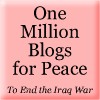 The expression "collateral damage," beloved by military types, is a neutralizing reference to the act of violently killing innocent noncombatants. Sometimes the infliction of "collateral damage" is accidental, as when a so-called smart bomb lands off-target. Sometimes it's intentional, as when a military target is hit with the full knowledge that, because of their proximity, noncombatants will die. But in either case, "collateral damage" is a weasel expression designed to neutralize the brutal state of affairs to which it refers: the murder of innocent people.
The expression "collateral damage," beloved by military types, is a neutralizing reference to the act of violently killing innocent noncombatants. Sometimes the infliction of "collateral damage" is accidental, as when a so-called smart bomb lands off-target. Sometimes it's intentional, as when a military target is hit with the full knowledge that, because of their proximity, noncombatants will die. But in either case, "collateral damage" is a weasel expression designed to neutralize the brutal state of affairs to which it refers: the murder of innocent people.
Friday, August 10, 2007
Neutralizing the Language of Murder and Torture
The expression "enhanced interrogation," beloved by Bushite bureaucrats and pseudo-patriots, is another neutralizing term. It refers to torture: the physical and psychological abuse of persons, the malfiguration of their identities, the breaking of their wills and the collapsing of their spirits, the infliction of wounds that will cripple them for the rest of their lives. It is a weasel expression designed to neutralize the brutal state of affairs to which it refers: the intentional and orchestrated destruction of another human being.
People who use these sorts of neutralizing references have uneasy consciences. They try to hide bitter reality by covering it over with pink linguistic icing. But this kind of dissimulation is disgusting. Slain and maimed noncombatants are not accidentally damaged items. Waterboarding, sensory overload, sleep deprivation, stress positioning, isolation: these are not innocent ways of asking questions.
Verbal neutralization of horrible deeds is a sign of cultural decay, reminiscent of expressions like "final solution" and "cultural revolution."
Posted by
The maiden
at
5:13 AM
![]()
Labels: collateral damage, enhanced interrogation, torturespeak
Subscribe to:
Comment Feed (RSS)





|